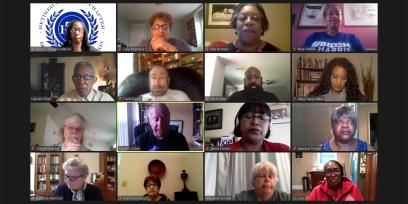Just ahead of Election Day, members of AFT Retirees’ Legacy Initiative held a webinar Oct. 23, focused on voter suppression and what can be learned from our history to prevent it in the future. The event included a panel discussion with Stacy Davis Gates, vice president of the Chicago Teachers Union and executive vice president of the Illinois Federation of Teachers, along with Keron Blair, executive director of the Alliance to Reclaim Our Schools.
“We are building on struggle after struggle. We are building on win after win. We hope to build a better, a more just country,” said AFT President Randi Weingarten who joined the discussion. Weingarten said the retirees have an understanding of the legacy connected to fighting for voting rights and what we need to do and how to do to it. “You know it takes a fight. … We need to be out there like our life depends on it, because it does,” she said. “The bottom line is we need to get everybody out to vote. We believe that every vote counts and that we count every vote.”
One reason the AFT created the Legacy Initiative was because retirees were seeing and hearing things that have happened before, in terms of racism and voter suppression, said Rita Runnels of Texas AFT Retiree Plus. The goal of the initiative is to end this racism and voter suppression.
When asked what can be learned from our history to better teach us how we fight for our rights today, Gates said that during the election cycle, voting is often considered the most important action a person can take. “In our zealousness, sometimes we forget to talk about the impact of protest, organizing and even the impact of strikes on the social fabric and the political spaces that we inhabit,” she said. “In the context of the civil rights movement, voting was symbolic of the self-determination of Black folks and how they had to fight for all facets of American life; but we cannot leave out the action, the protest and the organizing that undergird it.” She added that the civil rights movement also showed us how working in coalitions is necessary to transform our country. “So you've got to vote, protest and strike when it's necessary—and organize and build that coalition.”
There have been moments in American history that seem particularly dark and hopeless, said Blair. “One of the lessons for me with the civil rights movement is, difficult as it may be, often wired into American life is the possibility and prospect for major change,” he said. “Another critical lesson is that when we organize, people always try to tell us we are going too far, are demanding too much. It’s too fast, too soon—but it’s not. We are talking about human dignity and elevating each of us to the status of full citizenship and full rights.”
When asked what voter suppression looks like, Gates and Blair gave examples such as waiting in line for hours to vote, losing your eligibility to vote if you are convicted of a felony, requiring a driver's license or a state ID to vote, and the lack of same-day voter registration. Blair said that people of color and Black people in particular are disproportionately affected by these policies.
Austerity and policies also depress the vote, Gates added. “Individuals who are living in communities that have been under-resourced in every aspect—from the lack of affordable housing to police-sanctioned murder and abuse—don't feel connected. They don't feel as if the democracy itself has provided them, their families or their neighborhoods with the greatest amount of investment, care or support. So why would they vote? They don't see the point of voting. They don't see how it materially changes their situation.”
Addressing this disconnect will require elected officials to do the work that will increase voter participation, said Gates. “We have to be clear that once we are done with this election, the policies that folks always promise us become the reality that we begin to appreciate and benefit from. … So that my schools are fully funded, so I can walk my children to school, so my neighbor's house isn’t in foreclosure, so I can have a pension in my retirement and not feel threatened with financial insecurity, so that I have healthcare,” she said.
When asked about voter harassment at the polls, Gates suggested that retirees call on their allies to stand up and stand by them. Blair agreed, saying that people with privilege and power have to show up and be vocal, but added that it is not likely that many voters will have that experience.
Looking at future elections and ensuring everyone the opportunity to vote, both Gates and Blair called for a push at the federal level to expand voting rights. Gates noted that union locals should harness the power of their retired members. “I think that what we have to do is make sure that our political programs are connected to our retired space,” said Gates. “You have a group of activists who are politically astute and who understand coalition work, who understand how to knock on the door. Beyond anything, they understand the infrastructure of organizing. If we are not having retired members help to lead, guide and resource our political space, we are missing the opportunity to be successful in that work.”
[Adrienne Coles]

